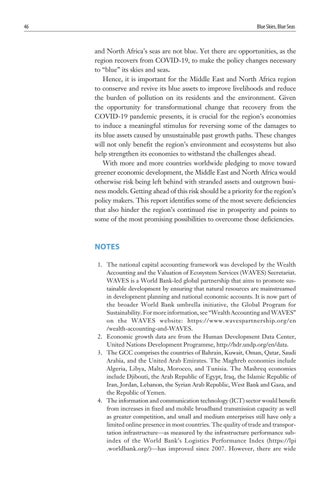46
Blue Skies, Blue Seas
and North Africa’s seas are not blue. Yet there are opportunities, as the region recovers from COVID-19, to make the policy changes necessary to “blue” its skies and seas. Hence, it is important for the Middle East and North Africa region to conserve and revive its blue assets to improve livelihoods and reduce the burden of pollution on its residents and the environment. Given the opportunity for transformational change that recovery from the COVID-19 pandemic presents, it is crucial for the region’s economies to induce a meaningful stimulus for reversing some of the damages to its blue assets caused by unsustainable past growth paths. These changes will not only benefit the region’s environment and ecosystems but also help strengthen its economies to withstand the challenges ahead. With more and more countries worldwide pledging to move toward greener economic development, the Middle East and North Africa would otherwise risk being left behind with stranded assets and outgrown business models. Getting ahead of this risk should be a priority for the region’s policy makers. This report identifies some of the most severe deficiencies that also hinder the region’s continued rise in prosperity and points to some of the most promising possibilities to overcome those deficiencies.
NOTES 1. The national capital accounting framework was developed by the Wealth Accounting and the Valuation of Ecosystem Services (WAVES) Secretariat. WAVES is a World Bank-led global partnership that aims to promote sustainable development by ensuring that natural resources are mainstreamed in development planning and national economic accounts. It is now part of the broader World Bank umbrella initiative, the Global Program for Sustainability. For more information, see “Wealth Accounting and WAVES” on the WAVES website: https://www.wavespartnership.org/en /wealth-accounting-and-WAVES. 2. Economic growth data are from the Human Development Data Center, United Nations Development Programme, http://hdr.undp.org/en/data. 3. The GCC comprises the countries of Bahrain, Kuwait, Oman, Qatar, Saudi Arabia, and the United Arab Emirates. The Maghreb economies include Algeria, Libya, Malta, Morocco, and Tunisia. The Mashreq economies include Djibouti, the Arab Republic of Egypt, Iraq, the Islamic Republic of Iran, Jordan, Lebanon, the Syrian Arab Republic, West Bank and Gaza, and the Republic of Yemen. 4. The information and communication technology (ICT) sector would benefit from increases in fixed and mobile broadband transmission capacity as well as greater competition, and small and medium enterprises still have only a limited online presence in most countries. The quality of trade and transportation infrastructure—as measured by the infrastructure performance subindex of the World Bank’s Logistics Performance Index (https://lpi .worldbank.org/)—has improved since 2007. However, there are wide






